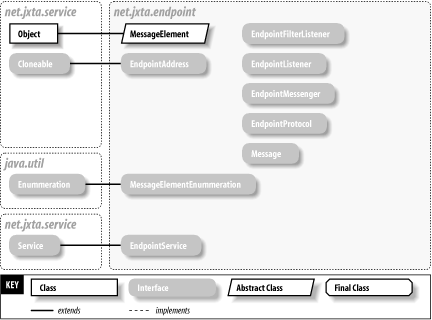Name
Package net.jxta.endpoint
Synopsis
The endpoint package defines two types of classes. The first deals with the representation of endpoints within the JXTA network (an endpoint is an abstraction of the entry to the network—e.g., a TCP address). A peer’s multiple network entries (e.g., TCP and HTTP) are represented by a single endpoint. The endpoint service is used by the JXTA infrastructure to handle messages sent through endpoints. In general, JXTA applications and services do not deal with these classes.
The second type of class is the message-related class. These classes are used to handle messages, which are the data objects sent and received over pipes. These classes are very common. Messages are structured documents (represented by XML tags) made up of a heirarchy of elements; they contain addressing information as well. The class hierarchy for this package is shown in Figure 9-5.

Figure 9-5. The net.jxta.endpoint package
Interfaces
public interface
EndpointAddress extends Cloneable; |
public interface
EndpointFilterListener; |
public interface
EndpointListener; |
public interface
EndpointMessenger; |
public interface
EndpointProtocol; |
public interface
EndpointService extends net.jxta.service.Service; |
public interface
Message; |
public interface
MessageElementEnumeration extends java.util.Enumeration; |
Classes
public abstract class
MessageElement; |
Get JXTA in a Nutshell now with the O’Reilly learning platform.
O’Reilly members experience books, live events, courses curated by job role, and more from O’Reilly and nearly 200 top publishers.

